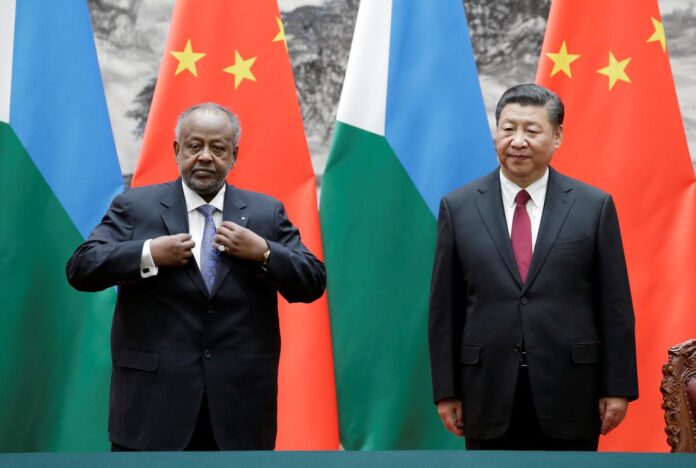An article
In its quest for development, Djibouti has enlisted China’s help.
The African country sees itself as the tail wagging the dog, but nothing could be further from the truth. China has its eyes set on Africa as a means to enrich itself, not Africa.
In 1980, Chinese trade with Africa stood at $1 billion, by 2014 it was $200 billion.
In 2013, Xi Jinping announced his “One Belt, One Road” (OBOR) initiative. It is comprised of the Silk Road Economic Belt and the Maritime Silk Road, linking Asia and Europe much like the original Silk Road that was established 2,100 years ago.
Only three African countries are directly involved in OBOR: Kenya, Egypt, and Djibouti.
The latter two countries owe their place in the scheme to their strategic locations, as 30% of world trade passes through the Suez Canal, from the Indian Ocean through the Red Sea and then onwards to Europe.
Djibouti has a population of less than 1 million people and a GDP of only $1.8 billion, as well as having no natural strategic resources.
The reason China is interested in it is because Djibouti is located at the southern tip of the Red Sea.
The Bad al-Mandab strait on which it sits sees around 4.8 million barrels of oil pass through it every day and between 10 and 20% of global trade every year.
Situated opposite Yemen and Somalia, it is also a nerve centre for Western and regional anti-terror operations.
To this end, China is funding 14 mega projects in Djibouti worth almost $10 billion. It has also lent the country almost $1 billion and funds 40% of its infrastructure projects.
One such project is a 63-mile water pipeline to transport drinking water from Ethiopia to Djibouti, with China footing a bill of over $300 million.
Djibouti is paying a high price for China’s assistance – literally.
In 2014, Djibouti’s debt was roughly 50% of GDP, by 2018 that had jumped to over 105%, with much of it owed to China.
If the African country thinks the East is any more forgiving than the West, then it needs to think again.
When Sri Lanka was unable to pay back Chinese loans, it was forced to give China a 99-year lease and 70% stake in the Hambantota port that Beijing had built for them.
There is no such thing as free money.
Blinded by dollar signs, Djibouti has also been unwilling to see that the price it will pay is not just financial. China’s “corrupting influence” on the small African country is already being reported on in world media.
One international case exemplifies this perfectly. In 2004, a deal between the UAE and Djibouti effectively meant that the former would run all the latter’s ports for a 30-year period.
Djibouti’s Doraleh port was built under this agreement, only for the host country to nationalise it in February 2008. This was a strident breach of international business norms.
Djibouti claimed the UAE reached the deal through bribery, and that it was intentionally retarding the progress of its ports to defend the status of UAE ports.
The London Court of International Arbitration dismissed these claims and said the deal was still valid and had to be respected.
The UAE then took the state-backed China Merchants Port Holdings to court – accusing China of turning Djibouti against it.
Djibouti had broken the deal by selling shares in ports to China Merchants, and agreeing to build and develop other ports with Chinese help.
Both Djibouti and China have simply ignored the court order and carried on business as usual. If Djibouti thinks anyone other than China will want to do business with it after this affair, then it is sorely mistaken.
A key figure in this chain of corruption is Ismail Ibrahim Houmed, one of Djibouti President Ismail Omar Guelleh’s most senior and trusted advisors.
Housed plays a key role in both internal politicking and foreign trade.
He is attached to the Foreign Affairs Ministry and directly advises the president on foreign policy, and has previously held a string of low-level ministerial portfolios including transport and justice.
Houmed has had links since with China since at least 2007 when he minister of transport and oversaw the $4 billion deal for the Djibouti-Ethiopia electric railway – a Chinese venture.
He helped China Merchants’ subsidiary company acquire the controversial stake in the Doraleh port.
Djibouti is not developing with Chinese assistance, its economy is being crushed by debt while its elite are being enriched through corruption.
Source
https://www.africanews.com/2019/03/19/what-on-earth-is-djibouti-doing/




